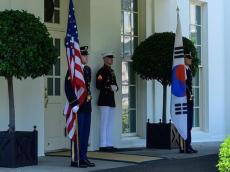Today.Az » World news » South Korea and United States resume diplomatic activities
25 December 2024 [08:00] - Today.Az

By Alimat Aliyeva The Republic of Korea and the United States are resuming diplomatic activities that had been suspended due to the imposition of martial law. According to sources, the two countries have agreed to restart events focused on diplomacy and security issues. This decision marks a significant step toward stabilizing and strengthening bilateral relations after a period of disruption. Earlier, South Korean Foreign Minister Cho Tae-yeol and U.S. Secretary of State Antony Blinken reached an agreement to meet face-to-face as soon as possible to discuss key matters, including ongoing security concerns and regional stability. This resumption of diplomacy comes at a critical time for both nations, as they continue to navigate regional security dynamics in East Asia. The suspension of diplomatic activities had raised concerns, particularly regarding North Korea’s actions and China’s growing influence in the region. With tensions rising over these issues, both countries recognize the importance of strengthening their strategic partnership. Cho Tae-yeol and Antony Blinken have emphasized the importance of maintaining a robust security framework in the region, particularly as North Korea’s missile tests continue to challenge regional peace and stability. The U.S. has reaffirmed its commitment to the denuclearization of the Korean Peninsula, while South Korea seeks to bolster its defense capabilities in light of increasing provocations from the North. Additionally, the diplomatic renewal signals a broader global shift towards strengthening alliances in response to geopolitical shifts, especially in the face of rising tensions between China and the West. Both South Korea and the United States are looking to deepen their cooperation not just on security, but also on economic and technological fronts, with a focus on trade, cybersecurity, and advanced technologies. This diplomatic thaw could also have significant implications for multilateral efforts in addressing global challenges, including the ongoing climate crisis and the global economic recovery in the post-pandemic era.
|